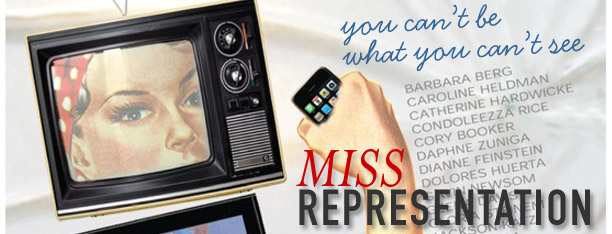Written, directed, and produced by Jennifer Siebel Newsom, the award-winning documentary Miss Representation (2011) tackles the issue of women’s underrepresentation and misrepresentation in television media.
The documentary illuminates the ways that the American television media is unkind to women–largely because it is controlled by a patriarchal society of (mostly white) men.
Working in the same position, women are presumed to be in a catfight, vying to be the Queen bee. This happens regularly on reality TV, but also among newswomen and in politics.
Typical stereotypes of women include “The Bitchy Boss” (Devil Wears Prada, The Proposal) or “The Fighting Fuck Toy” (Colombiana, Wanted). The latter stereotype demonstrates that even while action women stars seem to be empowered women who are in control, their bodies are on display and they are usually not in control of their romantic lives.
The documentary also chastised the hypersexualization of women. The representation of women as sex objects and body props is so pervasive that even animated characters in G-rated movies (like The Little Mermaid) wear sexually revealing clothes as much as adult women in R-rated movies. These animated characters spend their lives aspiring to find romance as well.
This hypersexualization of women in media makes the longevity of any woman’s on screen career problematic, so much that older women, if they desire to be on television, are urged to get botox or collagen injections.
In a patriarchial society, women are valued so long as they are in their childbearing years. Consequently, an overwhelming 71% of women on American television are women in their teens, 20’s and 30’s. Outside of the small screen, this group of young women only makes up 39% of the U.S. female population.
In fact, much focus on women in media zooms onto the female body and the pressure to remain youthful. Television ads envision men striving for power and women aspiring to be ever more beautiful.
Women get the impression from television that their bodies, attractiveness, and looks are all that matters. Women’s bodies are airbrushed, digitally altered, and enhanced. Real women judge themselves and are judged, both consciously and subconsciously, against these media ideals of technologically altered “perfection.”
But double standards exist for men and women. Men can be overweight television stars (Drew Carey is mentioned here), yet women are pressured to be abnormally thin.
Even women in positions of power are not exempt from these standards like when a Fox News anchor asked Sarah Palin to set the record straight about whether or not she has breast implants. And when people heckled Hillary Clinton to “Iron My Shirt” during her presidential campaign.
These are situations that women will inevitably face if they embark on the journey to become public leaders. Sadly, depictions of women in media do not embrace women in leadership, affecting their ability and desire to participate in the political process.
But here comes the real irony.
According to the documentary, 86% of purchasing power is in the hands of women. This admission makes us wonder to what extent are women–as both consumers and parents–perpetuating this cycle of imagery?
That is a point where the documentary misses out.
It only asks women to reflect upon what they see as problematic but not on how their own consumption and participation might exacerbate and not amend the issue.
Katie Couric though does point out that she might have influenced the trend of women wearing revealing clothing on news programs, citing times when she noticed after viewing herself that perhaps her skirt was a bit too high or her blouse too low cut.
Women can set an example with how they present themselves. And as parents, women can also set the tone for what images they condone in their households, unless of course someone else is footing the Netflix bills.
What is most impressive about the documentary is the list of speakers who bring their testimony to bear on the well-researched evidence: politicians like Condoleeza Rice and Nancy Pelosi, feminist activist Gloria Steinem, film director Catherine Hardwicke (Twilight), news anchors Katie Couric and Rachel Maddow, and actors Rosario Dawson and Jane Fonda, among many decorated others.
Although the documentary’s content is not overly surprising and the narration sorely lacks impetus to give vitality to the subject, hearing the issue of women’s misrepresentation brought to the fore by women prominent in media gives the cause a greater urgency–and perhaps would impel women and men, alike, to fix it.











I wonder if men will be impelled enough to fix this… but I hope so.
Great article. If 86% of the consumer population are women, then we can not blame anyone but women for feeding into this. For this to change, it is entirely dependent on women in my opinion. If after women have stopped buying into it and there’s no change then I will agree that men are equally responsible.
Look… women need to wake up for themselves. Alas who is raising these chauvinistic men? Let’s agree that society cannot be perfect but it is at least broken and shouldn’t be moving backwards. That said, we also need to stop point fingers.